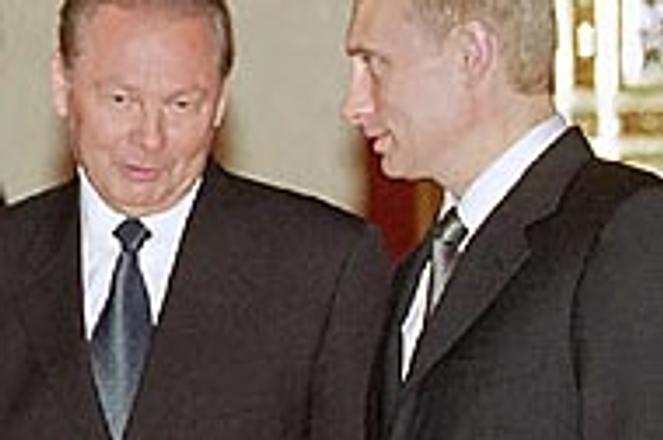Presidents Schuster and Putin meet in Moscow on the Slovak head of state's first official visit to Russia.photo: TASR
A pipeline running gas from Russia to the West and crossing Slovakia will almost certainly be built, Economy Minister Ľubomír Harach has confirmed.
The Jamal II pipeline, to be constructed by the Russian gas giant Gazprom, would see 60 billion cubic metres of gas pumped through Slovakia - a potential source of huge revenues in transport fees.
The 90 billion cubic metres that already flow through Slovak gas distributor SPP's pipes every year - two-thirds of the gas imported into western Europe - have brought massive revenues to successive Slovak governments.
Harach said that after meetings with Gazprom officials during President Schuster's first visit to Moscow he was "almost 100%" decided that they would go ahead with the pipeline.
The project had originally been at the centre of a potential diplomatic row between the Ukraine and Russia that threatened to scupper the construction of the lucrative transit link.
Moscow has accused the Ukraine of stealing gas from existing pipelines running from Russia through the Ukraine to the west and wanted to run the pipeline through Belarus and not the Ukraine. But the Ukraine objected and Poland said last year that it would not agree to the pipeline crossing its borders unless the Ukraine was involved, endangering the project.
However, on May 22 this year Polish gas firm PGNiG agreed to the new pipeline, allowing the gas to be transported via Belarus, Poland and Slovakia to the west.
The talks between an official Slovak delegation, which included a number of ministers and President Vadimir Putin and Russian industry leaders focused on bilateral economic cooperation in energy, transport and aviation. Joint ventures and investment into regions outside of Moscow and St. Petersburg were also discussed, said Harach.
Gazprom chief Alexej Miller said future supply contracts on the transport of crude oil through Slovakia had been discussed. Miller also confirmed Gazprom would submit a bid for a 49% state stake in Slovak gas utility SPP, the world's second largest gas distributor.
But while the talks were hailed as constructive by delegation members the visit by Schuster drew comparisons in Slovak media with previous visits by Vladimír Mečiar during his last term as prime minister from 1994 to 1998.
During his government's time in office Mečiar pushed Slovakia further away from the West and towards Russia, pursuing a policy of raising economic links between the two countries. This was viewed by many in the west as a worrying symptom of Slovakia's growing international isolation.
Just before parliamentary elections in 1998 then Russian president Boris Yeltsin sent a message to Mečiar saying he wanted him to win and that if he did "it would only be in the interests of the two countries".
Robert Fico, leader of the non-parliamentary Smer party and a member of Schuster's delegation, rejected suggestions Slovakia should not be looking to enter the Russian market.
He said that "the whole world is fighting for a place in Russia, the Ukraine and China" and that those markets were not places to be avoided. He added the EU market may not be what people were expecting.
When the current Mikuláš Dzurinda-led administration came to power in October 1998 it declared its ambition to take the country into Nato and the EU. It immediately oriented its trade and economic activities more towards the west and began reviewing relations with Russia, particularly in regard to the deblocation of billions of dollars of Soviet-era debt.
Deblocation of the debt under the previous Mečiar government involved Slovakia often receiving weapons rather than money for the debt. The current government was forced to return an order for Russian missiles as part of debt settlement agreed to under Mečiar in a move seen at the time as pleasing Nato but doing little to solve a complicated process of recovering debt.
The talks in Moscow last week also touched on the issue of the debt.
Russia recently persuaded the Czech Republic to accept a deal in which it would pay back a lump sum, much lower than the total outstanding Soviet-era debt, in one payment rather than continue with protracted negotiations on deblocking the entire amount.
So far Slovak attempts to deblock the money owed to it have been hampered by scandals over the group settling the debt and the form of the debt settlements agreed. Devín banka, which controversially won a mandate to deblock Russian debt two years ago, was put under forced administration in August after it was discovered fraudulent claims had been made about the entry of a strategic investor.
The move prompted immediate speculation that Slovakia could be forced into accepting a settlement similar to the Czechs'.
Some MPs say they are against such a settlement.


